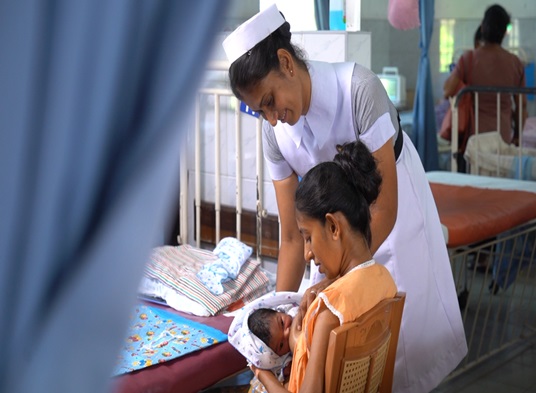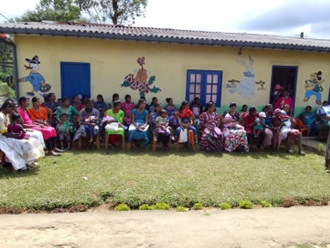Global evidence including evidence synthesis from World Health Organization (WHO) shows that breastfeeding has cognitive and health benefits for both infants and their mothers. It is especially critical during the first six months of life, helping to prevent diarrhoea and pneumonia, two major causes of death in infants globally. Children who are breastfed also have a lower risk of allergies, asthma, diabetes, obesity, skin rashes, and ear and respiratory infections[1] and mothers who breastfeed are less likely to become overweight or develop diabetes, osteoporosis, or breast or ovarian cancers. Exclusive breastfeeding for the first 6 months of life, followed by continued breastfeeding with appropriate complementary foods for up to 2 years and beyond, provides an infant the best start possible to life.
Global literature on nutrition on emergencies highlight barriers to breastfeeding during emergencies including mother’s limited nutrition intake, stress, and exhaustion, low perception on the adequacy of milk supply to satisfy infants, pressure from various groups to opt for formula feed, etc [2],[3]. Evidence also values community engagement and empowerment in breastfeeding promotion especially engaging community groups and Community-based Organizations (CBO) to promote and provide support for breastfeeding.[4] The COVID-19 pandemic has clearly shown the importance of community involvement in reaching the set targets.
In the first seven days of every August, World Breastfeeding Week intents to highlight the benefits that breastfeeding can bring to both the health and welfare of babies, as well as for mothers. WHO join hands with World Alliance for Breastfeeding Action (WABA), the global network that aims to protect, promote and support breastfeeding around the world.
In the South-East Asia Region, rates for the early initiation of breastfeeding range from 42% to 89%. WHO continues to support Member States to strengthen their capacity to protect, promote and support breastfeeding, in line with the Region’s Flagship Priorities on achieving universal health coverage, preventing and controlling noncommunicable diseases, and accelerating reductions of maternal, newborn, and child mortality.
Sri Lanka has one of the top breastfeeding rates in the world with 90% on early initiation of breastfeeding within the first hour of birth and 82% exclusive breastfeeding in the first six months (2016). Sri Lanka achieved green status in breastfeeding in 2020 based on its performance on ten indicators on policies and programmes. The World Breastfeeding Trends Initiative (WBTi) color- code and rank countries based on their performance as Red, Yellow, Blue and Green (ascending order) respectively[5].
The WHO Code for Marketing of Breastmilk Substitutes was endorsed by Sri Lanka and the Sri Lankan Code for Promotion of Breast Feeding and Marketing Breast Milk Substitutes and Products was issued in 1981 with subsequent revisions in 1998 and 2002. Women working in the government service are covered by paid maternity leave for 84 working days after delivery, a half-paid leave for another 84 days, with the option of additional 84 days of non-paid leave. In 1993, the Baby Friendly Hospital Initiative (BFHI) was adopted in Sri Lanka. The Lactation Management Centers in hospitals were established in 2005 to promote and support breastfeeding counseling. The Family Health Bureau, Ministry of Health is engaged in designing policies and strategies, staff capacity development, and monitoring and evaluating the breastfeeding initiatives in Sri Lanka.
WHO Sri Lanka has been a long-term partner with the Ministry of Health with other developmental partners in promoting breastfeeding. The focus has been mainly on, supporting evidence-based decision making, strengthening health system to promote, and sustain good practices and building and improving staff capacities.
World Breastfeeding week 2023 (#WBW2023) will focus on breastfeeding and employment/work showcasing the impact of paid leave, workplace support, and emerging parenting norms on breastfeeding through the lens of parents themselves. Governments, policymakers, workplaces, communities, and parents are needed to be advocated to play their critical roles in empowering families and sustaining breastfeeding-friendly environments in the post-pandemic work life.
WHO Sri Lanka has initiated efforts to enhance the capacities of working women on adopting optimum breastfeeding practices through advocating their work authorities and networks on breastfeeding promotion in collaboration with the Ministry of Health and the Scaling Up Nutrition People’s Forum (SUNPF) focusing on estate and Free Trade Zone (FTZ) communities which have higher female labour participation rates.
Initial assessment by SUNPF revealed that there had been minimal interruption to breast feeding support during pandemic and during the present economic crisis. Estate management continues to provide maternity benefits including paid leave to attend clinics, three months of paid maternity leave, a special allowance after childbirth, crèche facilities for infants, flexible working arrangements, and paid hours to breastfeed and other benefits to encourage mothers to continue breastfeeding on returning to work. Higher engagement of fathers in supporting breastfeeding at the household level was also noteworthy overcoming the gender- related barriers.
The assessment recommended the importance of providing paternity leave; amending laws to get paid maternity leave for the full duration of six months followed by half pay maternity leave; improving existing Child Development Centres (CDCs) as baby-friendly premises; enhancing awareness among estate authorities on baby-friendly policies and maternity benefits to allow mothers and babies to maximally enjoy their rights.

Free trade zones showed higher opportunities for improvement. Breastfeeding mothers were challenged with busy work schedules, limited transport, and lack of paid leave to attend clinics. Varying degree of implementing maternity benefits, absence of paternity leave and low awareness of authorities on parental benefits and lack of baby-friendly work policies were identified as points for further advocacy.

Caption - Estate Mothers participating awareness session on nutrition promotion
Courtesy : The Plantation Development Trust )
WHO Sri Lanka along with MOH and other stakeholders plans to engage with a series of advocacy efforts targeting estate and FTZ authorities to promote breastfeeding among working mothers.
WHO also works closely with Foundation for Health Promotion and Plantation Human Development Trust (PHDT) on skill building of Community Development Officers (CDOs),Plantation Family Welfare Officers (PFWOs), and public health staff on Health Promotion concepts to facilitate the improvement of child nutrition (including breastfeeding promotion) in the estate sector. WHO facilitated training of 73 staff who in turn initiated activities benefitting 118 community settings aiming to improve the functioning of Child Development Centers (CDCs) and community settings and to monitor the progress of health promotional activities. With these interventions, 195 children gained weight within the last 6 months, and more children were attending to CDCs.
Future steps
WHO will continue to support Ministry of Health to sustain Breastfeeding practices among working women and in the community by generating local evidence through rapid assessments, service delivery evaluation, and building capacities of service providers.
[1] Lodge CJ, Tan DJ, Lau MX, Dai X, Tham R, Lowe AJ, Bowatte G, Allen KJ, Dharmage SC. Breastfeeding and asthma and allergies: a systematic review and meta-analysis. Acta Paediatr. 2015 Dec;104(467):38-53. doi: 10.1111/apa.13132. PMID: 26192405.
[2] Hwang, C.H., Iellamo, A. & Ververs, M. Barriers and challenges of infant feeding in disasters in middle- and high-income countries. Int Breastfeed J 16, 62 (2021). https://doi.org/10.1186/s13006-021-00398-w
[5] https://www.worldbreastfeedingtrends.org /uploads/resources/document/wbti-pressrelease-9-jan-2020.pdf
